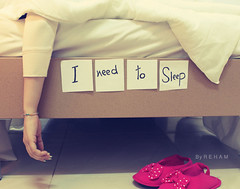
لاتتوقع ان تعيش كما حكت لك امك صغيرا حكاوي ماقبل النوم فالاجدر ان ترى مسلسل الحكايات فقط باحلام النوم لتصحى كبيرا بواقع اكبر ..
Originally uploaded by REHAM ~
This week the BBC World Service posted an article on their website entitled The Myth of the Eight-Hour Sleep. It mentions several historical accounts and scientific studies that suggest sleeping eight hours straight at night may not be natural for everyone. According to the article, a historian at Virginia Tech found more than 500 references to segmented sleeping patterns. Apparently it was normal to go to bed about two hours after the sun went down, sleep for four hours, get up for two hours, and then sleep for another four hours before rising for the day's work. Also, when I say "get up", I don't mean just sit up in bed. Some people would stay in bed and read, but others would walk around and have a smoke or even visit neighbors.
This article helped me make sense of the sleep patterns in my family. Off and on for years ABM has been visiting doctors to try to get to the bottom of the reason why he doesn't sleep all the way through the night. Each doctor would listen to the description of his night and speculate that he had sleep apnea, but every time he would have a sleep study done they would say that he doesn't have sleep apnea. I can't wait to tell him about this article, so he can stop feeling like there is something wrong with him.
C1 and M have had a segmented sleep pattern since they were little. I do NOT react well to someone waking me from a sound sleep, so I taught M early on to flip through picture books or listen to music until she felt sleepy again rather than come bother me. Yeah, I know -- bad Mommy!
I used to be able to sleep straight through the night. Taking traditional naps is difficult for me because once I drift off to sleep, I want to stay that way for four hours at least. Those 45-minute power naps that people take at lunch make me feel groggy and angry instead of refreshed. Nowadays my sleep pattern has turned into two naps with a wakeful period in the middle. My first sleep is 3-4 hours, and then I am awake for 1-2 hours. The length of my second sleep determines how I will feel at work the next day. If I can get another 3-4 hours before it is time to get up for work, then I'm good. Many days, however, I only get 60-90 minutes before the sun start shining in my bedroom window. I've never considered myself an insomniac, but I do wonder every night before I lay down if this will be a night where I sleep straight through. It rarely is. Now that I am armed with this information, perhaps I will adjust my bedtime to give me time to get a good long second sleep.
4 comments:
I stay up til about 1am and I'm usually up by 6 the next morning. Plus I try and nap for at least two hours in the afternoon. In fact, as I post this I'm in bed checking my RSS feed before I crash.
I can't remember the last time I had a normal sleep pattern when I wasn't sick. Especially fun pulling over for a nap on road trips.
Also try eating oatmeal for breakfast. I know it sounds weird, but I had a good 2 weeks of insomnia back in college (and it wasn't for fun reasons). I was desperate and started researching. Found the oatmeal trick, and it worked that very night.
Brad does the same thing though sometimes. I think it also depends on what's going on in your life at the moment. That's how it is with me anyway.
I'm a big fan of oatmeal and eat it often, but it doesn't change my sleep pattern. I think since four out of six of us have this segmented sleep, I would rather embrace it. I read another blog today with a post from 2006 covering this same subject, and the author had a similar reaction. If your body is prone to the idea of first and second sleep and you are able to work your schedule around it instead of feeling that something is wrong with you, I think you will feel more rested.
In that previous comment, I meant four out of six of us in this house.
When I read that BBC article, it was a real eye-opener. What the author was getting at was that sleeping straight through wasn't always considered "natural" or "normal" and that we might get more rest if we embrace what some people call insomnia and work around it.
Post a Comment